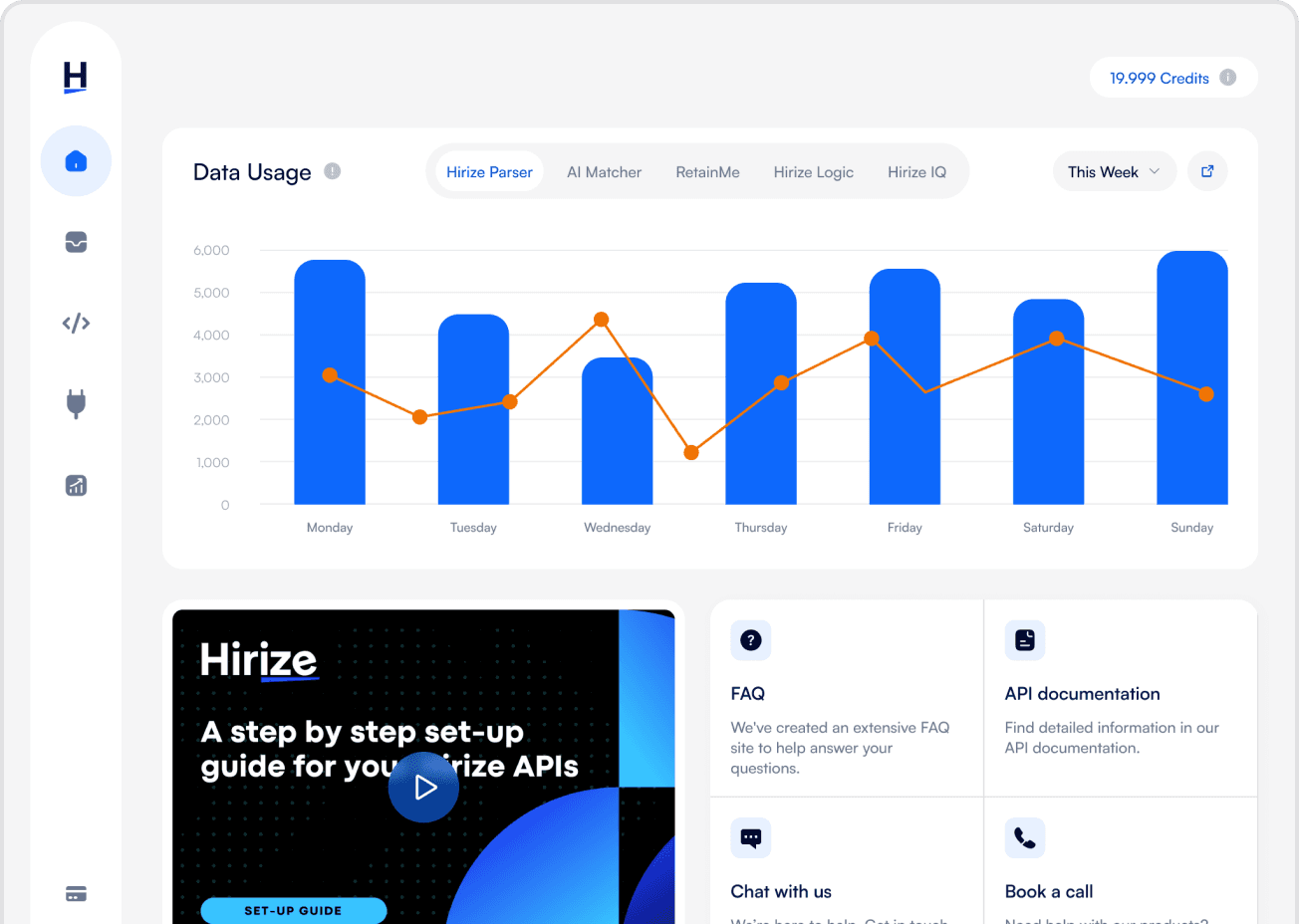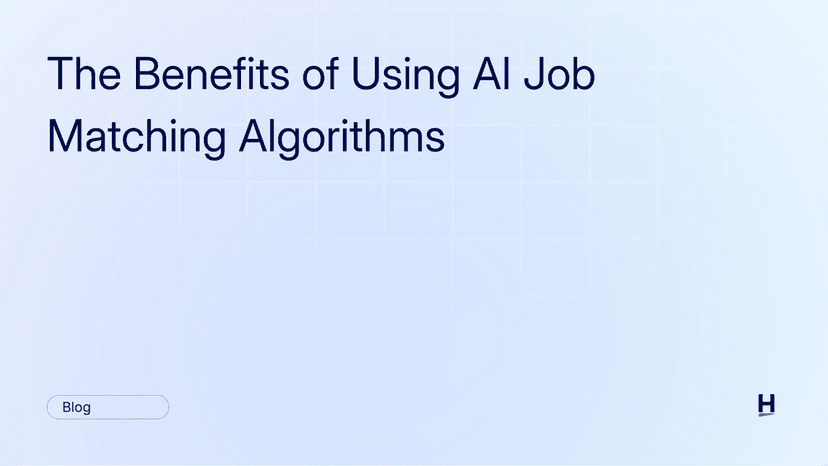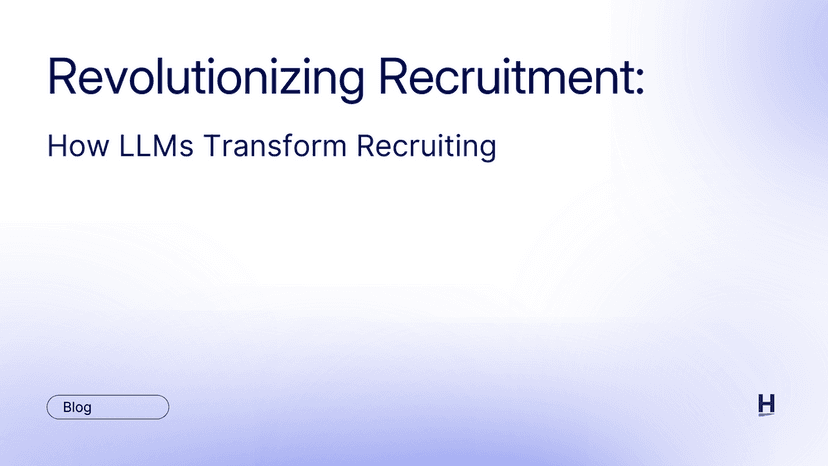superpowers?
The Future of HR Tech : Resume Parsing
Wondering what the future of HR tech holds? Check out our latest blog post on resume parsing and find out why this technology is so important.
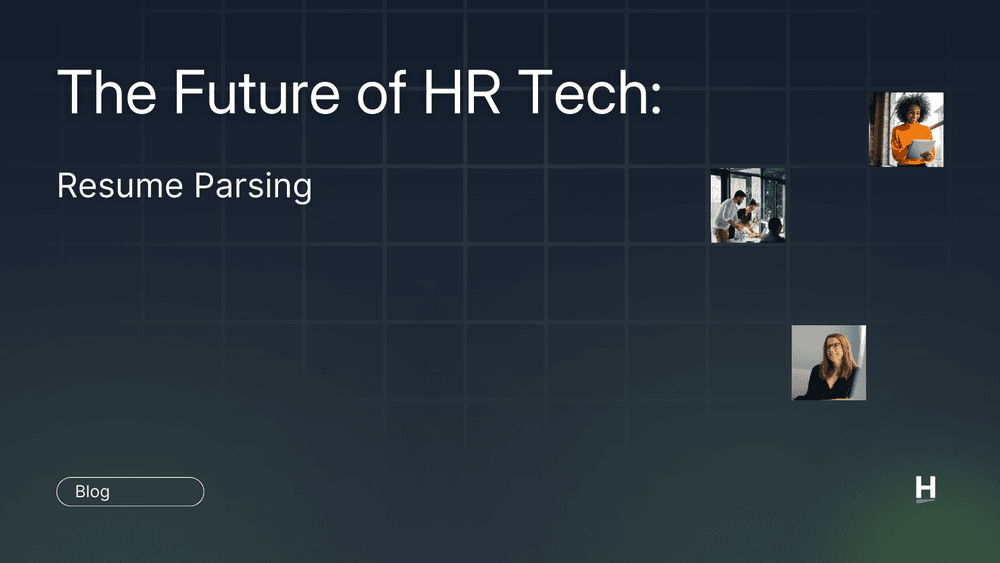
What is resume parsing and why is it important for the future of HRtech
If you're in the HR tech game, you've heard of resume parsing. But what exactly is it? Resume parsing is the process of extracting information from resumes and converting it into a structured format that can be easily read and analyzed by a computer. Sounds pretty complicated, right? But trust us, it's worth the effort. Here's why:
Resume parsing is becoming increasingly important as more and more companies move to an automated hiring process.According to an Eightfold AI survey, 73% of companies use AI to attract and hire employees, and it's easy to see why. By using resume parsing software, companies can quickly and easily sort through hundreds or even thousands of resumes to find the best candidates for a job. And with the help of machine learning, this process is only going to get more accurate and efficient over time.
So if you're not already using resume parsing in your HR tech stack, you're falling behind. The future of HR tech is all about automation, and resume parsing is a key part of that equation. Don't miss the boat - start using resume parsers today!
How does resume parsing work
By definition, resume parsing is the process of taking an unstructured resume or resume and converting it into a format that can be easily stored, retrieved, and reported on.
In order to create a unique database entry for each applicant, resume parsers examine a resume, extract the relevant data, and then save the data to the database. After reviewing the resume, the recruiter can use the data to find candidates who meet their criteria.
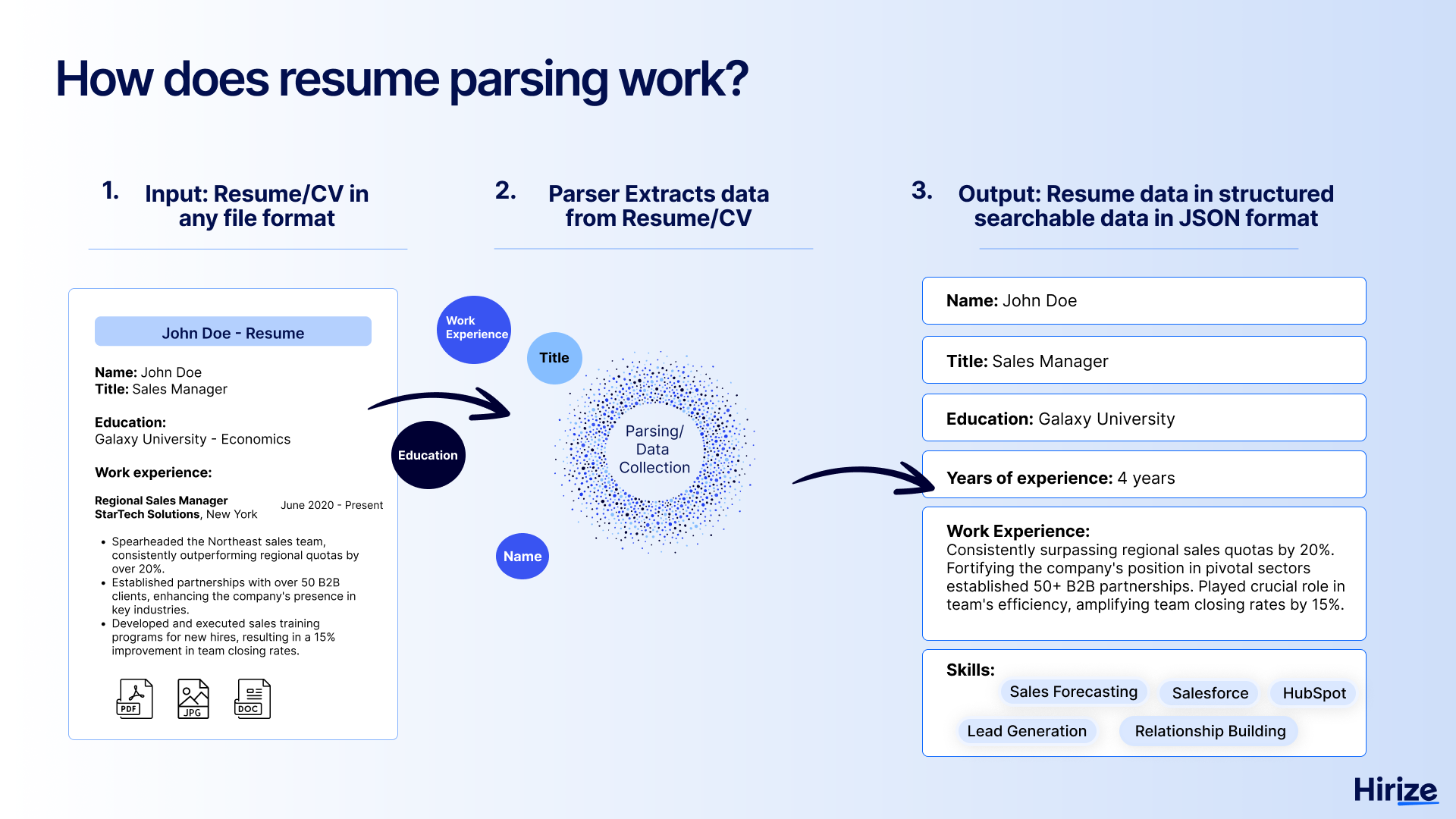
The benefits of using resume parsing technology
Resume parsing technology can be a valuable tool for employers, helping to save time and simplify the hiring process. By automatically extracting data from resumes, resume parsers can provide employers with a quick and efficient way to organize and sort candidates. In addition, resume parsers can help to identify key skills and qualifications, making it easier to match candidates to open positions.
Additionally, resume parsers can be used to track applicants over time, providing employers with valuable insights into how the candidate pool has changed. By harnessing the power of resume parsing technology, employers can streamline their hiring process and make better, more informed decisions about which candidates to interview.
Some examples of how to resume parsing can be used in HRtech
Resume parsing is software that can be used in a number of ways. For example, resume parsing can be used to automatically extract information from resumes and match candidates to job openings. This can save recruiters a lot of time and effort, and it can help to ensure that the best candidates are considered for each role. It can make the process easier for both the employers and the employees. According to , SHRM 69% of employees with a positive onboarding experience are likelier to stay with the organization for at least three years.
Resume parsing can also be used to create customized candidate portfolios, which can be helpful when reviewing applications. In addition, resume parsing can be used to generate data-driven reports on candidate trends. This information can be used to improve recruiting strategies and make the hiring process more efficient. Ultimately, resume parsing is a powerful tool that can be used in a variety of ways to improve the efficiency of the recruiting process.
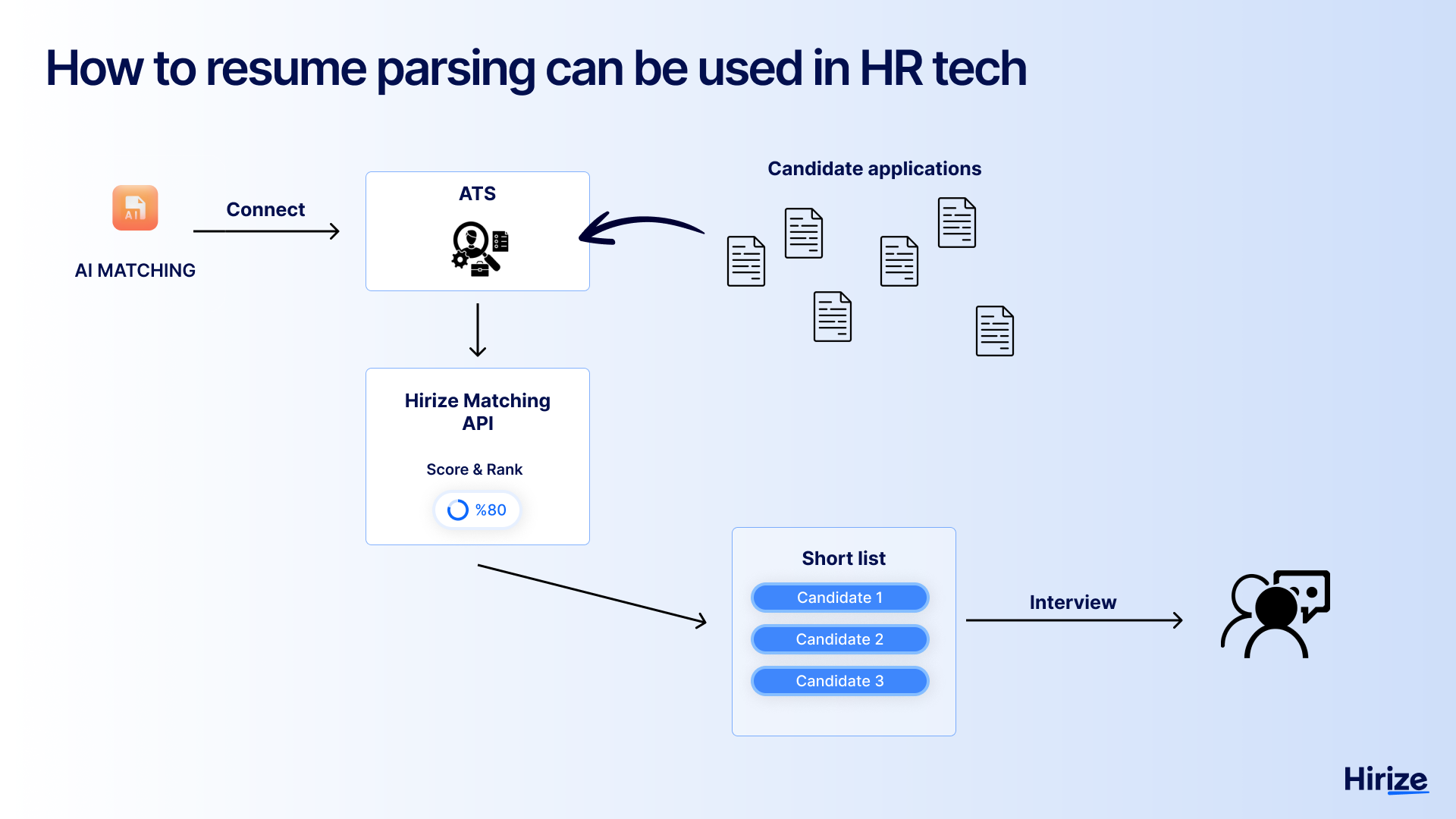
The future of resume parsing and how it will impact the world of HR
In today's fast-paced world, time is of the essence. That's why many businesses have turned to resume parsing, a technology that allows them to quickly and easily scan resumes for key information. However, resume parsing is not without its flaws. In particular, it often fails to identify important qualifications that are not spelled out in black and white on a resume. As a result, many qualified candidates are overlooked simply because their resumes don't contain the right keywords. In the future, resume parsing will become more sophisticated, taking into account a wider range of factors such as work experience, skills, and education. This will allow businesses to more accurately identify qualified candidates, saving time and money in the recruiting process. Ultimately, this will benefit both employers and job seekers alike.
Hirize offers solutions for HR Vendors, Startups, Agencies, and enterprises by offering their customers cutting-edge parsing and matching that is unrivaled in terms of speed, accuracy, and reliability. Our resume parsing technology uses natural language processing and machine learning algorithms to quickly extract the most pertinent information from resumes. We also offer a wide range of features for customizing your own parser or improving an existing one, including job type detection, semantic keyword analysis, named entity recognition, skill tracking, and more.
Conclusion
So what is resume parsing and why should you care? In a nutshell, resume parsing is the process of extracting data from resumes in order to make them easier to read and analyze. This technology is important because it can help automate the recruitment process by automatically extracting key information from resumes- such as name, contact info, experience, skills, etc.- making it possible for employers to quickly identify qualified candidates. If that sounds interesting (or terrifying) to you, keep reading. We're going to take a closer look at how resume parsing works and some of the ways it's being used in HRtech today. And if you're feeling brave, we'll even venture into the future of this exciting field.
Try Hirize Resume Parser now!
superpowers?
